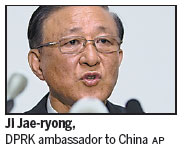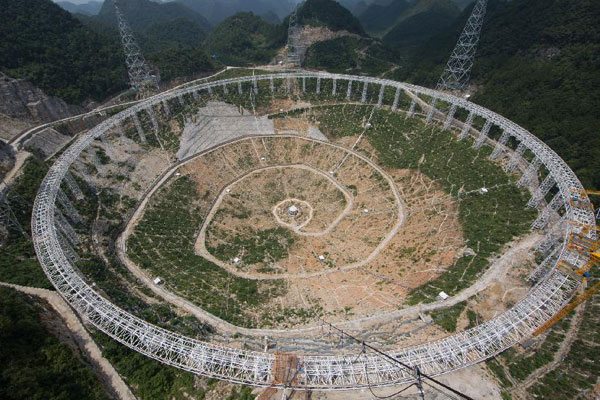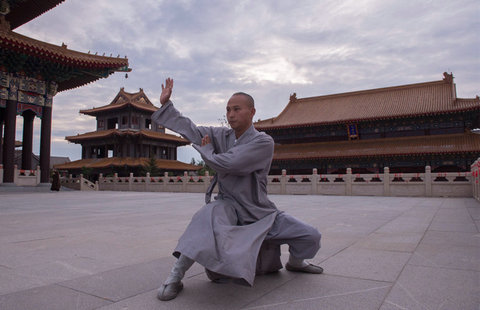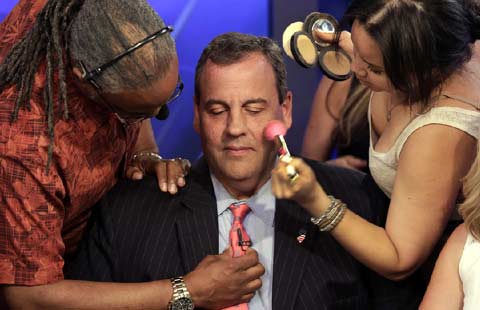Iran deal 'not right blueprint' for Korean Peninsula
Updated: 2015-07-29 11:22
By Chen Mengwei(China Daily USA)
|
||||||||
DPRK Ambassador to China Ji Jae-ryong said on Tuesday in Beijing that his country has no interest in any nuclear deal like Iran's, since the two countries' situations are "completely different".
At a rare news conference held at the embassy of the Democratic People's Republic of Korea, Ji reiterated Pyongyang's stand that the escalating tensions in the Korean Peninsula were rooted in the "hostile policies" set by the United States.
Ji told reporters that the Iranian agreement was reached through protracted efforts because Teheran wanted the international community to recognize its independent rights to nuclear activities, and it sought relief from international sanctions. However, the situation of the DPRK is completely different, he said, asserting that the DPRK "is a nuclear weapons state both in name and in reality".
"The DPRK is not interested in any dialogue to discuss the issue of freezing or dismantling its nuclear weapons unilaterally first," Ji said.
"We have the power to cope with any kinds of war methods of the US imperialists," he added, blaming the US for hindering his nation from developing its economy.

Sydney Seiler, the US special envoy to the Six-Party Talks regarding the nuclear disarmament of the Korean Peninsula, said on Monday in Seoul that the recent progress in denuclearizing Iran is "an excellent example" of the US flexibility and willingness in denuclearization talks.
On Wednesday in Beijing, Seiler, who is on a three-nation tour including China and Japan, will meet with his counterpart, deputy representative for Korean Peninsula affairs Xiao Qian.
Soon after the Iran deal, Foreign Minister Wang Yi referred to the deal as "a positive reference for coping with other international and regional hot spot issues, including the nuclear issue on the Korean Peninsula".
Wang Junsheng, a researcher of East Asian studies at the Chinese Academy of Social Sciences, said there is still a possibility that the top leader of the DPRK may consider negotiations to get the domestic economy out of its difficulties.
"It will be very hard for the DPRK to develop nuclear power and the economy at the same time," Wang said.
The DPRK held nuclear tests in 2006, 2009 and 2013.
The Six-Party Talks, which involve the DPRK, the Republic of Korea, China, Japan, Russia and the US, have been stalled since early 2009.
chenmengwei@chinadaily.com.cn
(China Daily USA 07/29/2015 page3)

 World's largest radio telescope being built
World's largest radio telescope being built Elvis Festival pays tribute to the King of Rock 'n' Roll
Elvis Festival pays tribute to the King of Rock 'n' Roll
 Four-color rice turns paddy field into artwork
Four-color rice turns paddy field into artwork
 Images capture modern life of a warrior monk
Images capture modern life of a warrior monk
 The world in photos: July 20 - 26
The world in photos: July 20 - 26
 Amazing landscape of China in white and black
Amazing landscape of China in white and black
 Across America over the week (July 17- July 23)
Across America over the week (July 17- July 23)
 Unusual but true: 'Love' conquers all
Unusual but true: 'Love' conquers all
Most Viewed
Editor's Picks

|

|

|

|

|

|
Today's Top News
Beijing condemns Somali attack, mourns deaths
Panda 'fakes pregnancy' to get better living conditions
China eyes deepened cooperation with overseas NGOs
Monster Hunt breaks Chinese box office record
Olympic bid panel cites city's merits
Astronomers discover most Earth-like planet yet
Seattle Chinatown leader killed in shooting
Flight details of Obama's Kenya trip leaked
US Weekly

|

|






